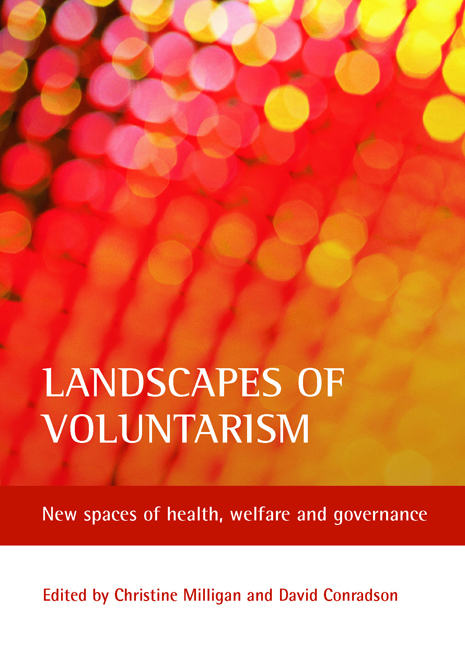Book contents
- Frontmatter
- Contents
- List of tables, figures, maps and plates
- Notes on contributors
- Foreword: Beyond the shadow state?
- one Contemporary landscapes of welfare: the ‘voluntary turn’?
- two A ‘new institutional fix’? The ‘community turn’ and the changing role of the voluntary sector
- three Renewal or relocation? Social welfare, voluntarism and the city
- four Voluntarism and new forms of governance in rural communities
- five New times, new relationships: mental health, primary care and public health in New Zealand
- six Informal and voluntary care in Canada: caught in the Act?
- seven Competition, adaptation and resistance: (re)forming health organisations in New Zealand’s third sector
- eight The difference of voluntarism: the place of voluntary sector care homes for older Jewish people in the United Kingdom
- nine Values, practices and strategic divestment: Christian social service organisations in New Zealand
- ten Faith-based organisations and welfare provision in Northern Ireland and North America: whose agenda?
- eleven Government restructuring and settlement agencies in Vancouver: bringing advocacy back in
- twelve Developing voluntary community spaces and Ethnicity in Sydney, Australia
- thirteen The voluntary spaces of charity shops: workplaces or domestic spaces?
- fourteen The changing landscape of voluntary sector counselling in Scotland
- fifteen Volunteering, geography and welfare: a multilevel investigation of geographical variations in voluntary action
- sixteen Reflections on landscapes of voluntarism
- Index
one - Contemporary landscapes of welfare: the ‘voluntary turn’?
Published online by Cambridge University Press: 15 January 2022
- Frontmatter
- Contents
- List of tables, figures, maps and plates
- Notes on contributors
- Foreword: Beyond the shadow state?
- one Contemporary landscapes of welfare: the ‘voluntary turn’?
- two A ‘new institutional fix’? The ‘community turn’ and the changing role of the voluntary sector
- three Renewal or relocation? Social welfare, voluntarism and the city
- four Voluntarism and new forms of governance in rural communities
- five New times, new relationships: mental health, primary care and public health in New Zealand
- six Informal and voluntary care in Canada: caught in the Act?
- seven Competition, adaptation and resistance: (re)forming health organisations in New Zealand’s third sector
- eight The difference of voluntarism: the place of voluntary sector care homes for older Jewish people in the United Kingdom
- nine Values, practices and strategic divestment: Christian social service organisations in New Zealand
- ten Faith-based organisations and welfare provision in Northern Ireland and North America: whose agenda?
- eleven Government restructuring and settlement agencies in Vancouver: bringing advocacy back in
- twelve Developing voluntary community spaces and Ethnicity in Sydney, Australia
- thirteen The voluntary spaces of charity shops: workplaces or domestic spaces?
- fourteen The changing landscape of voluntary sector counselling in Scotland
- fifteen Volunteering, geography and welfare: a multilevel investigation of geographical variations in voluntary action
- sixteen Reflections on landscapes of voluntarism
- Index
Summary
Introduction
Over the past two decades or so, governments in Australia, Canada, New Zealand, the UK and other Western states have sought to roll back state involvement in welfare provision. The aim has been to foster a radically pluralised social economy, with non-state actors centrally involved in the delivery of social and welfare services. As Salamon et al (1999) noted, voluntary organisations have formed a key element of this vision of pluralised welfare. The growing attention given to voluntarism, they argued, reflects the severe and ongoing fiscal pressures associated with public provision in Western states; intense doubts about the capability of national governments to deal with these matters effectively in isolation; and a breakdown in the neoliberal consensus that welfare problems can be dealt with by an encouragement of the private market. This constellation of concerns has, in part, led to the development of a ‘third way’ (Giddens, 1998), a central tenet of which is the belief that while both state and market have a legitimate role to play in the provision of social welfare, community and voluntary organisations are also critical players. Etzioni (2001) points out that a further core element of the ‘third way’ has been a desire to engage citizens in the development of responsible communities. Individuals socialised into a communitarian society, he maintains, have a moral obligation to that society and, hence, are likely to be more reasonable and productive than isolated individuals. Within this framework, voluntary organisations are seen to have an important role. Not only might they bridge the gap between state and market, but through their close connection to citizens and local communities, they also have the potential to act as sites for the development of active citizenship.
So it is not just welfare reform that has increased political interest in the voluntary sector. Concern over the erosion of citizenship and a perceived need to encourage the development of social capital has further underscored the potential of voluntarism as a mechanism through which to promote a local sense of civic responsibility and engagement (Brown, 1997; Putnam, 2000). In designating 2001 as the International Year of Volunteering, for example, the United Nations (UN) highlighted an international interest in the fostering of civic engagement through volunteering (Morris, 1999).
- Type
- Chapter
- Information
- Landscapes of VoluntarismNew Spaces of Health, Welfare and Governance, pp. 1 - 14Publisher: Bristol University PressPrint publication year: 2006
- 1
- Cited by



